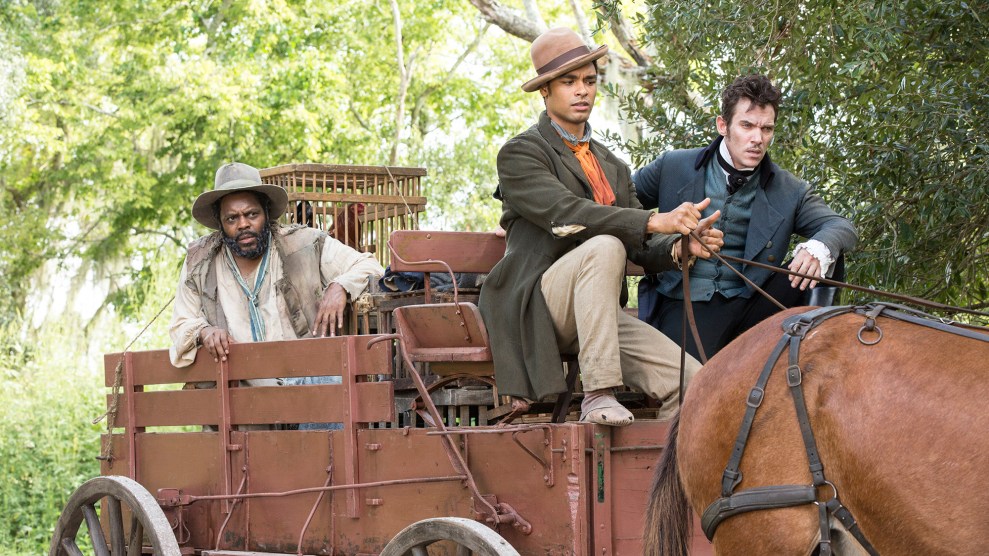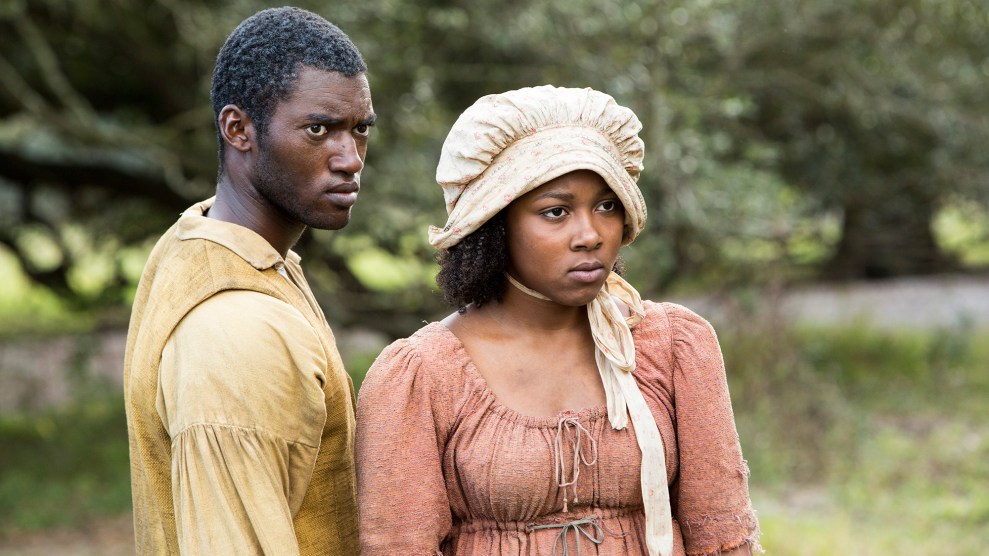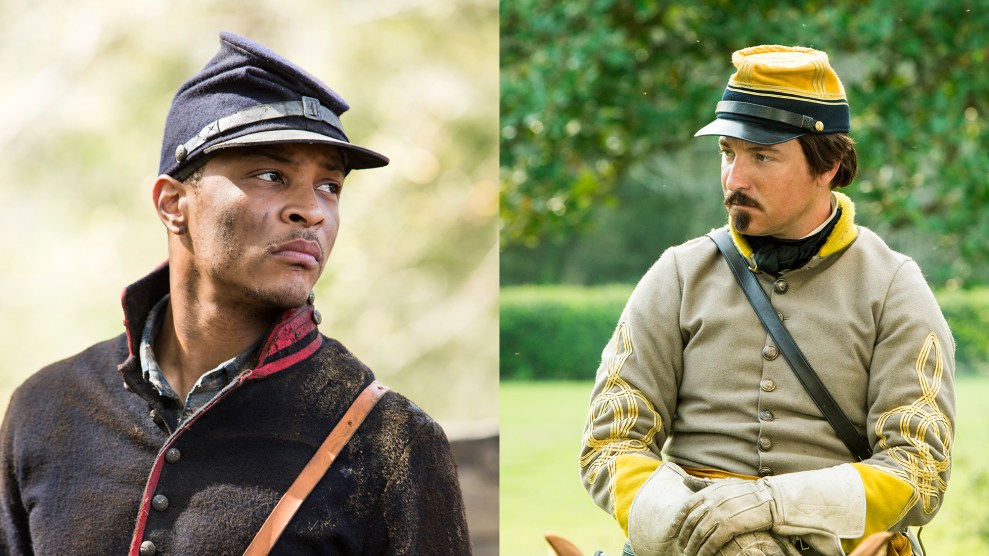
Cyrus (Tip "T.I." Harris) and Frederick (Lane Garrison)Steve Deitl/History
For the past four nights, I’ve been watching A&E/History’s Roots remake with Matthew Delmont, an Arizona State University historian who literally wrote the book on the topic: Out in August, Making Roots: A Nation Captivated covers the creation of Alex Haley’s fictionalized family history and the resulting 1977 miniseries on ABC—still the most-watched drama in the history of television.
Spoiler alert! Yesterday, Matt and I talked up the third installment, the saga of Chicken George and his relationship with his odious master (and dad) Tom Lea. (Here are our chats about episode 1 and episode 2; you can stream all episodes here.) Episode 3 ended with George being hauled off to England as payment for his master’s cockfighting debt. Today we tackle the fourth and final episode. The finale begins with a bit of narration: It’s 40 years later and the South is in an uproar—secession and civil war is coming. Against this backdrop, Chicken George returns from England a free man and sets out to find his family, who have been sold to a new owner. Mr. Murray is a decent guy as slaveholders go, but his son Frederick seethes with racial hatred and resentment about the changes threatening the white Southern way of life. We know straight away the dude is bad news.
Michael Mechanic: My wife and I were just talking about how these good ol’ boys would have been Democrats back then. The Republicans, and most of us forget this, were opposed to slavery: That was one of the main reasons the GOP was established. How things do change!
Matthew Delmont: The Confederates here are obviously the bad guys, but it was hard to watch and not think about all of the debates surrounding the Confederate flag and monuments to the Confederacy and slaveholders. Several scenes referred to the fact that many white people were never going to let this system go—even after the war. Strong echoes to today.
MM: Yeah, Frederick makes that pretty explicit. And you also have these bushwhackers—white vigilantes going around in the woods murdering freed slaves. Is that where the term “bushwhacker” comes from?
MD: I’m not positive on the origins of the term. But Chicken George is there trying to protect a black church from being burned down—it could be 1866, 1966, or 2016. One new scene here was the Ft. Pillow Massacre. I’m fascinated they included this! I couldn’t help think this was a jab at Forrest Gump and the casual way Hollywood has treated the history of the Civil War. Gump is named after Confederate General Nathan Bedford Forrest, who here gives the orders to murder 300 black Union soldiers who have surrendered.
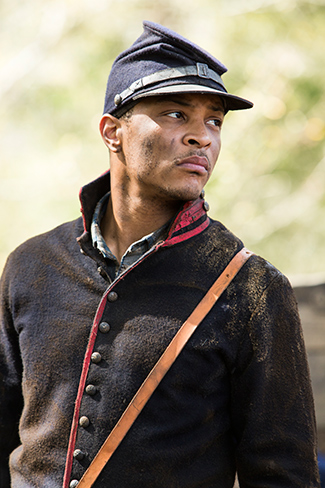
MM: How horrific was that scene? The white Union soldiers left standing amid the bodies of their black comrades. Just such a terrible betrayal of human decency.
MD: Yes, the black soldiers talk in the lead-up to the battle about how Forrest doesn’t take black prisoners. I don’t think this is what History’s regular audience is used to seeing about the Civil War. And airing around Memorial Day is a reminder of how military service has looked different for African Americans.
MM: And also how we sometime memorialize very bad men.
MD: Yes, it’s hard to have a romantic view of the slave South or the Confederacy. But people still love to get married at plantations, so I’m not sure what to make of all that.
MM: George’s son Tom, the blacksmith, ends up helping the Northern spies, who are later caught and hanged. I don’t remember much about the Civil War aspects of the original. Maybe you could reflect on that?
MD: Lots more Civil War here. In the original, the producers spent most of their budget on the first two episodes to make sure people would tune in. By the last few episodes they said it was like shooting “Black Bonanza.” They just wouldn’t have had money for a battle scene. But I like what they did with the new series to have George, Tom, and several other characters fighting the war in different ways. I loved Sedale Threatt Jr. as Tom. And I have to admit, I was suspicious of what Anna Paquin‘s character was going to be like, but when she revealed herself as a spy, I was legitimately excited.
MM: They hanged a white woman! Did you see that coming?
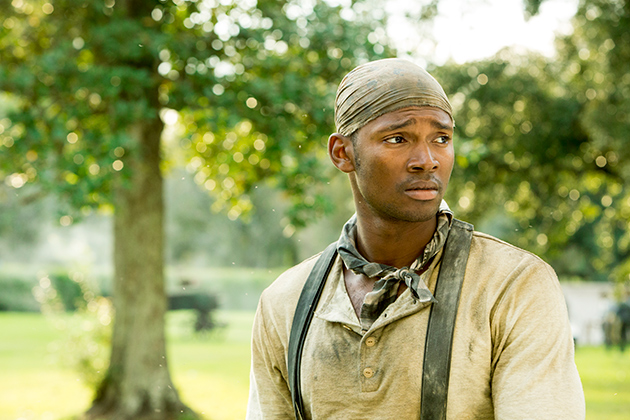
MD: No, that was a real surprise. I’m not aware of any historical examples of this, although there were women who spied for both sides. But I think the scene worked to show how demonic Frederick is—and then the visual of the two bodies swinging in the trees and Paquin’s vivid blue dress! Just startling. Reminded me of Kara Walker‘s silhouettes and how they make these plantation ideals into nightmares.
MM: Frederick is a monster. At the same time, both sides in that war would’ve hanged their own soldiers for cowardice, or for trying to desert. So it doesn’t surprise me they might string up a female spy. But I also wanted to talk about the scene near the end, where the free blacks are saying goodbye to Master Murray, and Chicken George shoots Frederick as Frederick is about to shoot Tom, George’s son. As viewers, we’ve seen this buildup of animosity between Frederick and his dad, and Mr. Murray is fully aware that Frederick is a bad seed. Even so, would Chicken George really have gotten away with killing the son of his former master?
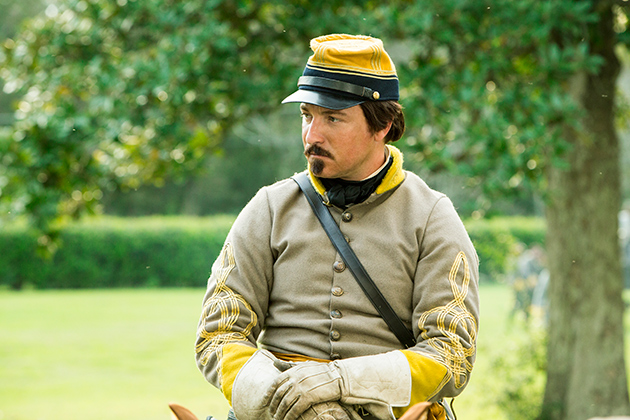
MD: Probably not. This scene, for me, was an echo of Kunta killing the overseer in episode 2. These characters get revenge is ways that probably aren’t historically accurate—and aren’t in the earlier versions of Roots, but it feels good. We’re asked to identify with Kunta, George, and others, and it is nice to see them fight back and off the bad guys.
MM: Sure, but letting them have that revenge provides an unrealistic relief from the way we experience slavery’s horrors. It’s that Django Unchained thing again. I’m pretty sure I remember Chicken George pulling out a gun in the original and kind of saving the day with a threat, but I’m also pretty sure he didn’t shoot anybody.
MD: I think this version is trying to have it both ways. There was that great scene earlier on where Tom tells his dad, George, that he is trying to chart the course that is best for his family, and that means not always fighting back even if he wants to. But then the two worst white characters get killed! I think the writers figured that post-Django audiences are going to expect that the enslaved people are going to fight and kill sometimes. I also have a totally unsubstantiated theory that History moved Roots up from fall 2016, when it was originally scheduled, to now so that it wouldn’t come out after the new Birth of a Nation, about the Nat Turner rebellion. I think those images of violence and of black people fighting back resonate so powerfully that they had to include more of that in 2016 than they did in 1977.
MM: That’s a pretty good theory. If I were the producer, I might have done that, too. Let’s get to about another moment from the finale, the scene when Tom, George, and a friend are running from the bushwhackers and cross the river to arrive at a Union military camp. The soldiers deny them entrance, so George falls right into his entertainer mode, preaching his son’s blacksmithing skills and hamming it up, and basically saves all their asses with his tomfoolery. That was nice.
MD: Yeah, loved that scene. Again, probably not realistic that he is going to change their minds in a minute, but it works. And I saw it as a nod to the power of a well-told story. One of the reasons people fell in love with Roots in the first place is that Alex Haley was an amazing storyteller. When Chicken George starts talking up Tom’s skills, how they come all the way from Mandinka culture, he was using his own skills to get them out of a jam.
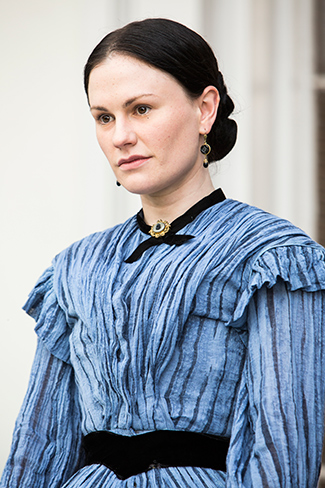
MM: As a master bullshitter! Okay, here’s a question: A white mom from our kids’ school told us she was in middle school when Roots first aired, and that white kids were getting beat up by black kids who were riled up by seeing how their ancestors were treated and I guess were looking for payback. Was this a thing, to your knowledge?
MD: There were two reports of violence post-Roots that I read about in newspapers from 1977. So I imagine there was some of that, but it probably wasn’t too widespread. It could be that Roots became the occasion for fights in winter/spring of 1977 that were just normal school fights. I think the interesting thing about that story is that Roots really made people feel the history of slavery in ways that they hadn’t before. It is one thing to know that slavery existed, but when you start tying that history to specific people, when you see those people born, get older and have their own families, that changes how you see slavery. That was the real power of Roots.
MM: On the other side, was there evidence that it improved race relations?
MD: There was definitely a lot more talking about race and slavery. There are tons of stories of ordinary Americans talking about Roots at work, school, bars, churches, etc. That kind of mass communal viewing experience really isn’t possible anymore, but Roots definitely touched a nerve with people. “National conversations on race” is a Clinton-era phrase and is probably overused, but Roots would be one of the first national conversations on race. Now, one can dismiss all of that as just talk, but I’d rather have popular culture encouraging people to talk about our nation’s history than something else. And generally people are very uncomfortable talking about slavery or race. Roots provided a way for many more people to think and talk seriously about this history.
MM: The new series was well done, but all along I felt it could have benefited from a little more space to stretch out. Here the Civil War starts, and then, bang, it’s over! They could’ve used six episodes, or done it as a single-season TV drama with a dozen one-hour segments. Do you think they figured it would get more attention as a miniseries?
MD: Part of the Roots brand is that it aired on eight straight nights, so I think they wanted to honor that. The original is uneven, and it does drag in parts, but I agree they could have stretched this one out a bit more. Especially since they added in new scenes and historical references; why not go even further with that? One place I noticed the quick pacing in this episode was with Irene, Tom’s wife. We never really learn anything about her, but then we see her being raped and that’s what changes Tom’s mind to participate with the Union spies. It’s hard to juggle all of these characters over 100-plus years in only four episodes, but they were using the rape as a quick plot point without giving us any sense of who Irene is—unlike how we got to know Kizzy over the prior episodes.
MM: What other moments stood out for you?
MD: The quick cut from the celebrations of freedom to the now-free black characters working the fields as sharecroppers, lamenting, “We’re out here same as before.” The series doesn’t do much with post-Civil War and Reconstruction, but I like the gesture to the fact that things didn’t change all of a sudden after the war ended. And I liked how they came back to the naming ceremony at the end. This was one of the iconic moments of the original book and series and I thought they did a nice job of making it fresh. That last line from Tom, something like, “That’s why I got to tell you this story, so I can be the kind of father I want to be.” That’s just great TV writing!
MM: I liked that they made it realistic. These are real, fallible people. So maybe early on, they hadn’t cared that much about their roots, and both Chicken George and Tom had forgotten the details of the ritual, so they kind of cobbled together their own.
MD: Yes, that sense that traditions are cobbled together and reinvented was threaded throughout. The song Kunta learned from his mother is now played by black string groups across the South, even if they don’t know where it came from. And how Kunta says that jumping the broom doesn’t actually come from Africa, but he’s willing to do it anyway if it matters to Belle. And how the “Behold the only thing greater than yourself” scene is different each time. George and Tom aren’t exactly sure how it goes, but they make it work.
MM: I thought the thing with Kunta’s song was a brilliant touch of continuity. Even the white soldiers were playing a version of it in their camp. It’s a nice reminder that there were a lot of contributions by black people, including slaves, that they weren’t credited for, but those contributions live on.
MD: All praise to Questlove on the music! It was understated but compelling throughout the series. What did you make of the final scene, when we see Lawrence Fishburne as Alex Haley, and having him walk through history meeting his ancestors?
MM: Mmm. That was a little bit cheesy. You sense the producers trying to tug at your heartstrings.
MD: I’ll be fascinated to see what viewers make of this, because I don’t think many people under 35 really know Alex Haley. They might be confused. I’ve obviously been thinking about Haley and Roots a lot over the past few years, so I liked the corniness. I also thought the final lines, “The truth can never be known, it can only be told in a story…I hope my story honors him,” was a good way to try to get past the fact-fiction debate over Roots and recognize that it was always intended to be a remarkable story.

MM: Is Haley clear on that in his personal writings?
MD: Not really. He describes Roots as “faction”—a mix of fact and fiction. There are a few unpublished letters where he comes close to suggesting that his story was meant to be representative, not nonfiction. He got boxed in a bit by how he described the story initially as nonfiction, and then Doubleday and ABC emphasized that it’s a true story because they thought it would sell better. It is clear now that it was historical fiction, but I think Haley really wanted to believe the stories he heard in the Gambia about how Kunta Kinte was abducted on this specific date. I think he wanted to suspend disbelief, and I think that’s how a lot of readers and viewers approached Roots. Part of what people liked was that it was almost unbelievable that a black person could trace his ancestry back that far. That mystery was exciting, and I think it is a good thing to have that sense of mystery in some of our histories.
MM: So to sum up, just as a regular viewer, would you say the new series is an improvement over the old? Or is it unfair to ask a historian such a question?
MD: I can take off my historian hat. I found the new version more entertaining, and I thought the acting was much stronger. That probably has something to do with writing and production values, but I thought almost all the actors were excellent. What about you?
MM: It’s definitely better as entertainment, and more historically accurate in a lot of ways. The desire for those modern plot elements, the revenge bits, like I said, might detract from the wallop a bit. Then again, you don’t want it to be 1,000 percent depressing—you need small victories. So I thought it was a good reimagining. Whether I want my 11-year-old to watch it is something I’m still debating.
MD: Yes, I think they were successful. The original will always have the 100 million-plus viewers, but some of the best parts of the new series were when they took the story in new directions. A nice reinventing of traditions!
This concludes our four-part recap of the new Roots miniseries. Click here to read our discussions of the first, second, and third installments.
This story has been updated.

